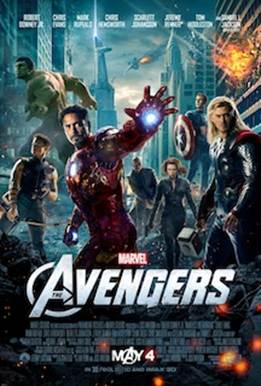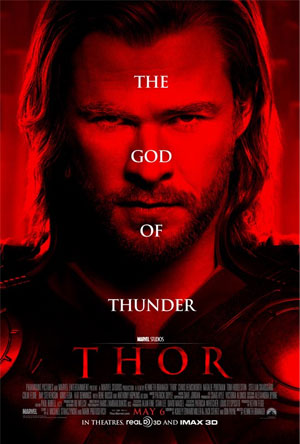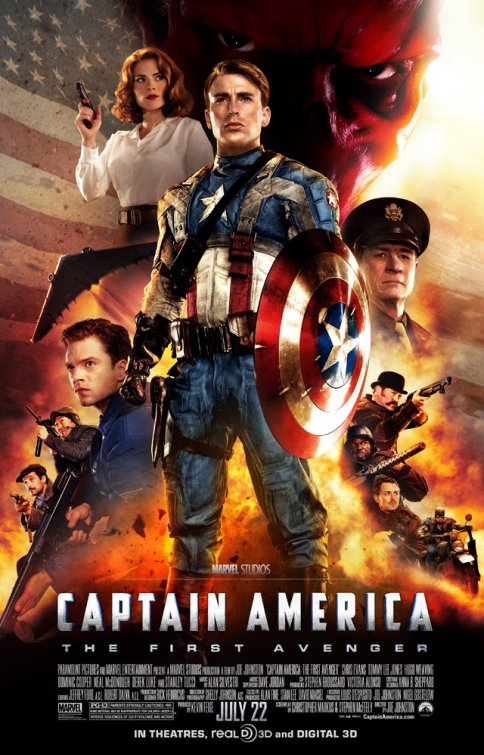TSR Blog: The Villainous Box Office Success of 'The Avengers'
 A god more indestructible than The Avengers' nemesis Loki, Ned Beatty's character Arthur Jensen in Sidney Lumet's drama Network will forever be one of the most powerful villains in all of film. His face illuminated by a row of green lamps in a dim conference room, this chairman of a massive media conglomerate educates future TV prophet Howard Beale (played by Peter Finch) about "the primal forces of nature," something that speaks galactically beyond accusations of greediness towards "The 1%." In the movie's epiphanic moment, he informs Beale that "... There are no nations, there are no peoples ... there is only one holistic system of systems, one vast and immane, interwoven, interacting, multivariate, multi-national dominion of dollars ... It is the international system of currency which determines the totality of life on this planet ... That is the atomic and subatomic and galactic structure of things today!"
A god more indestructible than The Avengers' nemesis Loki, Ned Beatty's character Arthur Jensen in Sidney Lumet's drama Network will forever be one of the most powerful villains in all of film. His face illuminated by a row of green lamps in a dim conference room, this chairman of a massive media conglomerate educates future TV prophet Howard Beale (played by Peter Finch) about "the primal forces of nature," something that speaks galactically beyond accusations of greediness towards "The 1%." In the movie's epiphanic moment, he informs Beale that "... There are no nations, there are no peoples ... there is only one holistic system of systems, one vast and immane, interwoven, interacting, multivariate, multi-national dominion of dollars ... It is the international system of currency which determines the totality of life on this planet ... That is the atomic and subatomic and galactic structure of things today!"
In this monologue Jensen screams that the concept of ideology is no longer a characteristic in our world that has become a "college of corporations." Instead, he creates the image of those who truly run the world never discussing essentially how to improve our planet, but instead solely focusing on computing "the price-cost probabilities of their transactions and investments."
A spin on a saying associated with comic book movies, "Your franchise is only as powerful as its villains."
This crushing magnitude of Arthur Jensen-like villainy certainly loomed over me last July as my very comic book-literate friend Adam Mohrbacher and I exited a matinee showing of Captain America: The First Avenger. In a daze of regret, we tried to comprehend what would lay ahead for the next chapter of the monstrous cinematic genre that is comic book movies.
We were laughing with each other about what was to come next, with special consideration on how Captain America turned out - bloated and silly, with an incredibly cheesy Avengers teaser ("Some Assembly Required!") at the end that only made things bleaker.
The entities behind these massive comic book adaptations movies, with their faces lit by green lamps in conference rooms sounded to us like crazed and screaming gift-givers. "You want an Ant-Man movie? What's that? You've never heard of him? Doesn't matter, here you go!"
And yet as we were giggling with self amusement about the possibility of an obscure character from the Marvel canon like The Wasp receiving her own massive film and kindergartener backpacks to boot, we missed the point about the real evil behind this overindulgence we are at the receiving end of.
It's not just that seemingly random superheroes are no longer safe from the clutches of "The Green Lamp" people, it's that this onslaught of these (generally mediocre) movies based off niche characters could be infinite and unstoppable (unless we start throwing our money in a different direction, which is a discussion for a whole other post). It's a greedy perpetual villainy that no comic book bad guy could ever rival in its eternalness. The battle against massive comic book movies being of mediocre quality is no longer about disagreeing with the choices made by a group of suits, but instead clashing against such "primal forces of nature."

I did not realize what I had previously misunderstood until I saw The Avengers, a movie I was not looking forward to for a long time, and for an even longer time, wanted to fail. If any movie were large enough to be a disturbing sacrifice witnessed by those of "The Green Lamps," if any comic book film were to begin the downward spiral of quality in these films, it would have to be the culminating mothership that is The Avengers.
After all, a failure for the very expensive Avengers would maybe humble these adapters who handle their revered franchises with the philosophy of "quantity over quality." Instead of churning out multiple comic book character movies each year, perhaps those in control of such brands would slow down and focus more on the aspects these cinematic franchises ultimately receive their strength from, like a rich story. Also with such a failure, perhaps the people in control of these brands would simply get to take a step back and realize that the appetite for such adaptations has reached the point of morbid obesity; that more comic book movies doesn't mean they're necessarily getting any better.
Instead, here we are. The Avengers is a very fine movie; a success with audiences and critics alike. It has great spectacle for a comic book movie, and provides the fun that a summer film (especially one this expensive) should be giving its large, 3D-glasses wearing audiences. The scenes get bigger and bigger until it looks like all three Transformers movies at once, all while firing off a whole arsenal of crowd-pleasing material. Hulk has never smashed to such a warm reception, the crowd roared at the first sight of Thor, etc. It is a very entertaining massive multiplex flick, albeit one constructed to sell toys and little kid t-shirts just like the former expensive movies that led up to it.
But there is no doubt that the success of Avengers (both critically and financially) is going to send the wrong message. Those in Arthur Jensen's conference rooms will see the sum and not the parts, ignoring the proven fact that these "parts" are not strong enough to successfully carry expensive feature films on their own. If the past course of films leave any indication, these movies will make money, but they will not widen the potential for future comic book movies hoping to leave an impression, as The Avengers achieves with both size and intricate thoughtfulness. Eventually, all of these films fall back on the pillow-like expectations where comic fans and general moviegoers alike shrug together and ultimately agree, "Well, it's a comic book movie. What more can you expect?"
Indeed, The Avengers is fulfilling in part because it utilizes these hyped up comic book characters as how they should be used - various flavors that compliment each other and combine together for a very tasty, accomplished sundae. Watching Captain America is akin to eating only sprinkles for dessert. 
The Avengers is certainly inspiring (AKA confirming the money-making box office potential of) more comic book movies, and more spin-offs from previously laid brands. However, we won't see the influence of The Avengers' crucial size on these movies, as no spin-off film will be able to reach this bar that Whedon has raised for the massiveness of entertainment. Our next best bet for a movie of this enveloping size and massive satisfaction (due to its "nerdgasmic" multi-character-driven moments especially) is going to be The Avengers 2. Until then, we will be sifting through the stories of characters with movies that are overall comparably insignificant, such as spin-offs like Captain America: The First Avenger, or in movies of other "universes" such as X-Men Origins: Wolverine.
Why is such so regrettable? Amongst the general wave of crappy movies we are about to receive, and the never-ending influx that such a blockbuster blitzkrieg will be coming, there's a more sentimental concept at hand. The pride created for these fictional characters is tarnished by the constant cannibalistic need to desperately feed from whatever gives these franchises their vitality. Especially in our adaptation-addicted storytelling Hollywood age, there's always an issue of sacredness, met with the universal complaint involving leaving a story alone. No other genre within Hollywood is more guilty of not showing a true reverence for an established "legacy" than comic book films, as they will reboot entirely constructed characters and series within 3-5 years of release dates. Is it crazy to think that in a strange yet possible future blockbuster films could be an eternal cycle of only franchise movies, with brands only dying out when box office receipts aren't up to par? (Or at least, until they get rebooted?) Regardless of whatever these franchises and their characters might mean to fans, (the supposed large target audiences that demand some sort of "respect for the material,") these brands lose their individual expression and become as recyclable and refillable as plastic bottles. (Though someone like director Christopher Nolan has acknowledged that The Dark Knight Rises is indeed a finale, a reboot of DC Comics' Batman film series is already set on IMDb to start in 2015).
(Disney's four billion dollar purchase of Marvel has admittedly made the fleeting concept of power by sacredness within the comic book movie universe even shakier, since studios are now making movies so that they can continue to own previously profitable characters like Daredevil or Spider-Man and not lose their cinematic rights. This is something that makes the rotation of these products even more perpetual; the motivation to bring these characters repeatedly to the multiplex has somehow become even more driven desperately by money.)
For a movie like The Avengers, this type of pride in storytelling and general filmmaking is a lucky bonus in the scheme of the movie's cyclical existence. It's the passion of an inspired movie maker who wants to perpetuate these brands with heads held higher; he wants to instill a sense of self-worth. Any director with the slickest resume could have made this movie, but Whedon has a distinct pride for the series as a fan, and a commitment to his merit as a successful artist. He wants to give people a great story from material that he cherishes, one that will certainly make those involved with it proud, and not just for how much it satiates the villain Arthur Jensen's "primal forces of nature."
A credit to Whedon's ingenuity and passion for the material, The Avengers has certainly made its amount of "reichsmarks, rins, rubels, pounds, and shekels." To date, the $220 million dollar production has claimed a hat trick on weekend box offices, domestically destroying expensive movies like Battleship ($209 mil. production budget) and Dark Shadows ($150 mil. production budget) on its war path. Now, The Avengers has The Dark Knight's box office records in its sights, with BoxOfficeMojo predicting that Whedon's film will top Nolan's to be the third highest-grossing film in the history of all movies.
With one only left to imagine the massive aftermath of The Avengers that will loom on years and years of the films that Hollywood cares about most, perhaps we can find some form of bleak comfort in the defeated wisdom from Watchmen, a twelve-issue comic book that was never meant to have a sequel, a spin-off, or even a mainstream adaptation.
After having changed the course of the world forever at the cost of half of New York City's population, the most all-knowing and richest man in the world Adrian Veidt, (Ozymandias), briefly consults Dr. Manhattan for reassurance about his actions. Before vanishing to another galaxy, the "super-powered being" with control over physical matter offers Veidt only this:
Adrian Veidt: I did the right thing, didn't I? It all worked out in the end. Dr. Manhattan: 'In the end'? Nothing ends, Adrian. Nothing ever ends.
-
Special thanks to Adam Mohrbacher of Filmophilia and TJ McKimmey for our various conversations